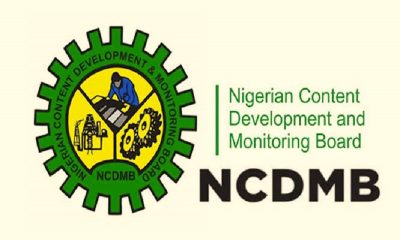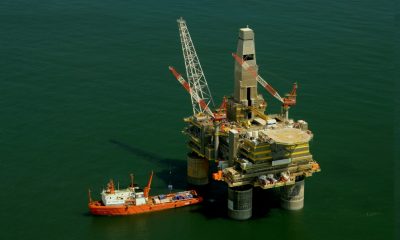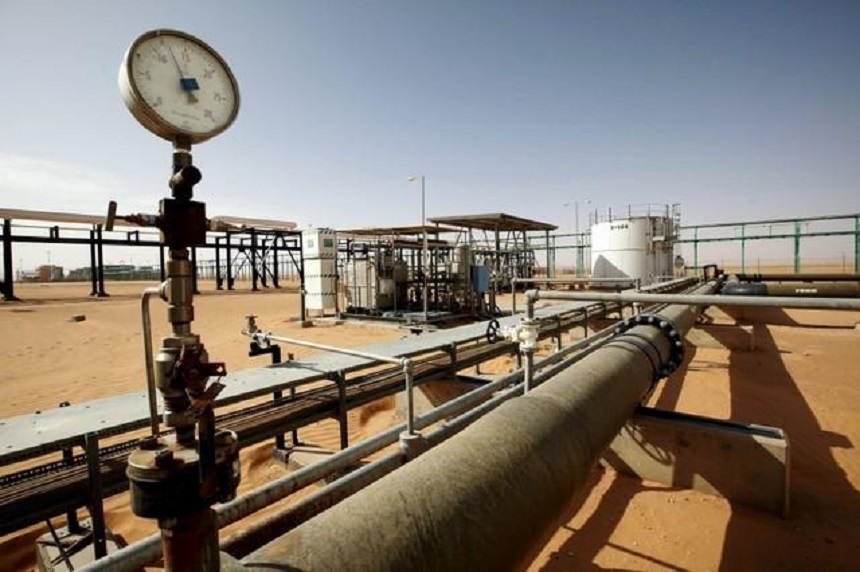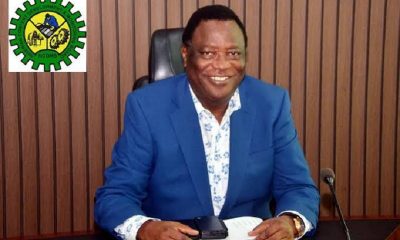Economy
NCDMB to Launch New Contracting Cycle Guidelines to Boost Oil Production

By Adedapo Adesanya
The Nigerian Content Development and Monitoring Board (NCDMB) has announced plans to launch new Contracting Cycle Guidelines for the oil and gas industry.
This is in line with President Bola Tinubu’s directives for acceleration of oil and gas contract timelines, incentivising investments in the sector and increasing Nigeria’s crude oil production, according to the Executive Secretary of the NCDMB, Mr Felix Omatsola Ogbe.
He announced this at the two-day Contracting Cycle Guidelines Sensitization Workshop organized by the Project Certification and Authorization Directorate of the Board for international and indigenous oil and gas companies operating in the country.
The workshop provided a platform for NCDMB to explain the provisions of the guidelines and how it would implement them in alignment with the Nigerian Oil and Gas Industry Content Development, NOGICD, Act and the Presidential Directives.
Mr Ogbe represented by the Director of Project Certification and Authorization at the commission, Mr Abayomi Bamidele, emphasised that NCDMB was a business enabler hence the decision to get stakeholders’ feedback before finalizing and launching the guidelines at the forthcoming Practical Nigerian Content Workshop slated for December 3-5, 2024 at the Nigerian Content Tower, Yenagoa, Bayelsa State.
To further assist the companies, he promised that NCDMB would convene a technical workshop in the first quarter of 2025 to train personnel of operating and service oil and gas companies on how to efficiently complete various technical documents utilized in oil and gas contracting process.
“The three Presidential Directives are the Presidential Directive on Local Content Compliance, Presidential Directive on Reduction of Petroleum Sector Contracting Cost and Timelines; and Presidential Directive on Oil and Gas Companies (Tax Incentives, Exemption, Remission, etc).”
Commenting on the objectives of the Presidential Directives, Mr Ogbe canvassed that for Nigeria to deepen local content practice and grow the sector, it must eliminate premium margins charged by some service companies, stop frequent policy changes and ensure that final investment decisions were signed regularly, to catalyse new projects.
He recommended that at least one or two FIDs should be signed at the annual oil and gas conferences, to create activities in the sector.
“The Presidential Directive on Local Content Compliance addressed issues pertaining to NCDMB, while the Presidential Directive on Reduction of Petroleum Sector Contracting Cost and Timelines referred to NCDMB and the Nigerian National Petroleum Company and its investment arm, the NNPC Upstream Investment Services, NUIS.
“NCDMB is working to support oil firms to accelerate their projects and take advantage of the incentives provided by the Presidential Directive on Oil and Gas Companies (Tax Incentives, Exemption, Remission,) etc,”
“The Board was mandated to develop templates to collapse its touchpoints on the contracting cycle to enhance the business environment within the provisions of the law.
“Accordingly the Board has reduced its touchpoints from nine to five for open tenders and selective tenders, while retaining only four touchpoints for single source contract.
“Another goal of the Presidential Directive is to eliminate intermediaries with no demonstrable capacity and to develop structured processes to determine, verify and document in-country capacities and capabilities.
“The Board has adopted robust pre-qualification and technical evaluation process, policy revisions to provide clarity on in-country value addition for OEM representatives and in-country capacity audit every two years.
“Another objective of the Presidential Directive is to target global benchmarks. Thus, NCDMB is proposing the co-creation of tender cost templates/tariffs, the promotion of joint venture of local/foreign service companies, the adoption of robust waiver management system by the Board and conveyor belt of at least two final investment decision (FID) per year.”
Economy
Stock Market Gains N2.367trn as All-Share Index Rises 2.06%

By Dipo Olowookere
The Nigerian Exchange (NGX) Limited appreciated by 2.06 per cent on Friday, amid a rush for local equities due to encouraging earnings of companies for 2025.
Business Post reports that the buying pressure was across the key sectors of Customs Street yesterday, with the banking index growing by 2.49 per cent. The energy industry appreciated by 2.05 per cent, the consumer goods counter grew by 0.78 per cent, the insurance space improved by 0.64 per cent, and the industrial goods sector expanded by 0.44 per cent.
At the close of trades, the market capitalisation went up by N2.367 trillion to N117.027 trillion from N114.660 trillion, and the All-Share Index (ASI) gained 3,687.45 points to close at 182,313.08 points compared with the previous day’s 178,625.63 points.
Cornerstone Insurance, Infinity Trust, and Nestle Nigeria appreciated by 10.00 per cent each to sell at N6.38, N9.90 and N2,662.00, respectively, while Okomu Oil rose by 9.99 per cent to N1,327.00, with RT Briscoe up by 9.97 per cent to N17.42.
Conversely, SAHCO depleted by 10.00 per cent to M135.00, Guinness Nigeria lost 9.97 per cent to trade at N103.00, Omatek shrank by 9.39 per cent to N2.99, NPF Microfinance Bank decreased by 6.51 per cent to N5.60, and eTranzact slipped by 6.33 per cent to N10.80.
A total of 53 stocks ended in the green side and 33 stocks finished in the red side, representing a positive market breadth index and strong investor sentiment.
Data showed that 936.4 million shares valued at N52.7 billion were transacted in 50,068 deals on Friday versus the 698.3 million shares worth N28.438 billion traded in 50,886 deals on Thursday, indicating a rise in the trading volume and value by 34.10 per cent, and 85.56 per cent apiece, and a slip in the number of deals by 1.61 per cent.
First Holdco closed the session as the most active equity with 106.3 million units worth N5.1 billion, Zenith Bank transacted 72.6 million units valued at N5.7 billion, United Capital traded 45.4 million units for N963.2 million, GTCO sold 45.0 million units worth N4.9 billion, and Fidelity Bank exchanged 31.4 million units valued at N639.0 million.
Economy
OTC Securities Exchange Extends Positive Run by 0.86%

By Adedapo Adesanya
The NASD Over-the-Counter (OTC) Securities Exchange rose further by 0.86 per cent on Friday, February 13, with the market capitalisation growing by N20.27 billion to N2.378 trillion from the previous session’s N2.357 trillion, and the NASD Unlisted Security Index (NSI) rising by 33.87 points to 3,974.77 points from the 3,940.90 points it ended a day earlier.
The improvement recorded by the bourse yesterday was influenced by six price gainers led by Okitipupa Plc, which went up by N18.00 to sell at N260.00 per share compared with the previous day’s N242.00 per share.
Further, Central Securities Clearing System (CSCS) Plc added N3.39 to quote at N80.47 per unit versus N77.08 per unit, IPWA Plc chalked by 31 Kobo to finish at N3.44 per share versus N3.13 per share, Lagos Building Investment Company (LBIC) Plc gained 31 Kobo to settle at N3.41 per unit versus N3.10 per unit, Afriland Properties Plc appreciated by 31 Kobo to N16.51 per share from N16.20 per share, and Food Concepts Plc increased by 8 Kobo to N3.28 per unit from N3.20 per unit.
There were three price losers, led by MRS Oil Plc, which weakened by N10.00 to close at N170.00 per share compared with Thursday’s price of N200.00 per share, FrieslandCampina Wamco Nigeria Plc lost N2.59 to sell for N65.52 per unit compared with the preceding session’s N68.10 per unit, and Geo-Fluids Plc depreciated by 33 Kobo to N3.30 per share from N3.63 per share.
During the session, the volume of securities transacted by the market participants went up by 9.5 per cent to 9.4 million units from 8.6 million units, the value increased by 1,206.5 per cent to N703.6 million from N53.9 million, and the number of deals grew by 7.1 per cent to 45 deals from 42 deals.
CSCS Plc remained the most traded stock by value (year-to-date) with 27.1 million units exchanged for N1.5 billion, followed by Resourcery Plc with 1.05 billion units traded at N408.6 million, and Geo-Fluids Plc with 29.9 million units valued at N152.6 million.
Resourcery Plc ended the day as the most traded stock by volume (year-to-date) with 1.05 billion units sold for N408.6 million, followed by Geo-Fluids Plc with 29.9 million worth N152.6 million, and CSCS Plc with 27.1 million units sold for N1.5 billion.
Economy
Naira Value Further Dips 0.13% to N1,355/$1

By Adedapo Adesanya
The Naira depreciated further against the United States Dollar by N1.76 or 0.13 per cent on Friday in the Nigerian Autonomous Foreign Exchange Market (NAFEX) to close at N1,33.42/$1, in contrast to the N1,353.66/$1 it was exchanged a day earlier.
However, the Naira appreciated against the Pound Sterling in the same market window yesterday by N5.05 to trade at N1,844.59 versus Thursday’s closing price of N1,849.64/£1, and against the Euro, it improved by 75 Kobo to quote at N1,60/€1 versus the previous day’s N1,608.68/€1.
At the GTBank FX desk, the domestic currency lost N6 on the US Dollar on Friday to settle at N1,365/$1 versus the preceding session’s N1,359/$1, and at the parallel market, it chalked up N10 to trade at N1,430/$1 versus the previous day’s N1,430/$1.
The weakening of the Nigerian currency in the official market happened as the Central Bank of Nigeria (CBN) refrained from intervening in the official window.
The FX supply side was eclipsed by growing demand for foreign payments. Exporters’ inflows, non-bank corporate supply, and other market participants’ contributions had enhanced the FX liquidity level.
Pressure came with the entry of all duly licensed Bureau De Change (BDCs) into the official foreign exchange, although there are indications that the move will help the Naira-US Dollar exchange value, as BDC operators have started approaching their banks to understand the operational modalities and framework for accessing Dollars.
As for the cryptocurrency market, benchmarked tokens improved as US interest rate futures on Friday raised odds of rate cuts by the Federal Reserve after a report that showed inflation rose less than expected in January.
Data showed the Consumer Price Index (CPI) rose 0.2 per cent last month after an unrevised 0.3 per cent gain in December, with Solana (SOL) up by 7.9 per cent to $85.17, and Ethereum (ETH) up by 6.5 per cent to trade at $2,059.78.
Further, Cardano (ADA) added 5.3 per cent to close at $0.2758, Ripple (XRP) jumped 5.1 per cent to $1.42, Bitcoin expanded by 4.8 per cent to $69,357.35, Litecoin (LTC) grew by 4.7 per cent to $55.27, Binance Coin (BNB) jumped 4.0 per cent to $621.88, and Dogecoin (DOGE) increased by 3.8 per cent to $0.0965, while the US Dollar Tether (USDT) and the US Dollar Coin (USDC) remained unchanged at $1.00 each.
-

 Feature/OPED6 years ago
Feature/OPED6 years agoDavos was Different this year
-
Travel/Tourism10 years ago
Lagos Seals Western Lodge Hotel In Ikorodu
-

 Showbiz3 years ago
Showbiz3 years agoEstranged Lover Releases Videos of Empress Njamah Bathing
-

 Banking8 years ago
Banking8 years agoSort Codes of GTBank Branches in Nigeria
-

 Economy3 years ago
Economy3 years agoSubsidy Removal: CNG at N130 Per Litre Cheaper Than Petrol—IPMAN
-

 Banking3 years ago
Banking3 years agoSort Codes of UBA Branches in Nigeria
-

 Banking3 years ago
Banking3 years agoFirst Bank Announces Planned Downtime
-

 Sports3 years ago
Sports3 years agoHighest Paid Nigerian Footballer – How Much Do Nigerian Footballers Earn


















